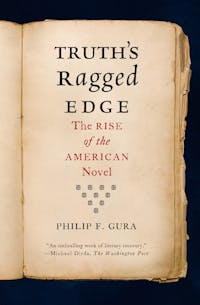Truth's Ragged Edge
The Rise of the American Novel
 Download image
Download image
ISBN10: 0374534403
ISBN13: 9780374534400
Trade Paperback
352 Pages
$19.00
CA$26.00
From the acclaimed cultural historian Philip F. Gura comes Truth's Ragged Edge, a comprehensive and original history of the American novel's first century. Grounded in Gura's extensive consideration of the diverse range of important early novels, not just those that remain widely read today, this book recovers many long-neglected but influential writers—such as the escaped slave Harriet Jacobs, the free black Philadelphian Frank J. Webb, and the irrepressible John Neal—to paint a complete and authoritative portrait of the era. Gura also gives us the key to understanding what sets the early novel apart, arguing that it is distinguished by its roots in "the fundamental religiosity of American life." Our nation's pioneering novelists, it turns out, wrote less in the service of art than of morality.
This history begins with a series of firsts: the very first American novel, William Hill Brown's The Power of Sympathy, published in 1789; the first bestsellers, Susanna Rowson's Charlotte Temple and Hannah Webster Foster's The Coquette, novels that were, like Brown's, cautionary tales of seduction and betrayal; and the first native genre, religious tracts, which were parables intended to instruct the Christian reader. Gura shows that the novel did not leave behind its proselytizing purpose, even as it evolved. We see Catharine Maria Sedgwick in the 1820s conceiving of A New-England Tale as a critique of Puritanism's harsh strictures, as well as novelists pushing secular causes: George Lippard's The Quaker City, from 1844, was a dark warning about growing social inequality. In the next decade certain writers—Hawthorne and Melville most famously—began to depict interiority and doubt, and in doing so nurtured a broader cultural shift, from social concern to individualism, from faith in a distant god to faith in the self.
Reviews
Praise for Truth's Ragged Edge
"Updated literary history at its very best. By assimilating recent rediscoveries of Afro-American and women's fictions—and adding new insights and new titles of his own—Philip F. Gura has given us the only comprehensive study of the tumultuous, ever-growing marketplace of the early American novel. He shows us how the ‘sentimental' tradition of women's domestic fiction became an unexpected vehicle for conveying spiritual and social heresy."—John McWilliams, Professor, Middlebury College
"Combining his various fields of expertise, [Gura's] latest venture aims to tell the story of the American novel in its first century. It begins in 1789 with William Hill Brown's The Power of Sympathy, which Gura finds to be the earliest known American novel, and follows the technological innovations that influenced the evolution of the novel, and the cultures that grew up around it, in its first hundred years."—The New Yorker
"Comprehensive and fresh . . . Spirited . . . Driven by a desire to encourage a new generation to read a forgotten trove of writing."—Tom F. Wright, The Times Literary Supplement
"An enthralling work of literary recovery . . . If you think that academics now only write for each other, this book will come as a revelation . . . In his acknowledgments, Gura writes that his book was partly inspired by Edmund Wilson's magisterial Patriotic Gore: Studies in the Literature of the American Civil War. Future scholars will be comparably inspired by Truth's Ragged Edge."—Michael Dirda, The Washington Post
"What's most impressive about Truth's Ragged Edge is Gura's ability to corral all this material into a coherent literary history with an overarching theme: The ongoing tension in American fiction between the individualized pursuit of happiness and communal values grounded in old-time religion."—Mike Fischer, Journal Sentinel (Milwaukee)
"Gura provides a long-awaited new map of American fiction."—The American Scholar
"Philip F. Gura has written the most ambitious, most comprehensive study ever attempted of American fiction from its beginnings to 1868. You will find here some novelists you've never heard of alongside old friends such as Cooper, Hawthorne, and Melville. By looking at novels thematically, and in the light of American religious history, Gura has produced a profoundly new kind of literary history, one linked beyond dispute to American theological concerns and American religious life. This book will change the way you look at the American novel. A grand achievement." —Robert D. Richardson, Bancroft Prize–winning author of William James: In the Maelstrom of American Modernism
"Most modern-day readers wander into early American fiction as if it were the back lot of an old movie studio—full of strangely garbed frontiersmen ready for wilderness adventure. Truth's Ragged Edge brilliantly brings us face-to-face with dozens of fictional characters much more like us—urban, introspective, worried about moral survival in a money-grubbing society. Philip F. Gura's book has created a new genealogy of American anxiety."—Richard Rabinowitz, President, American History Workshop
"Philip F. Gura's capacious book offers insightful literary analyses, deft book summaries, and concise biographies of authors that will be of great use to those interested in American fiction during its formative period."—David S. Reynolds, award-winning author of Walt Whitman's America: A Cultural Biography
"Truth's Ragged Edge will allow you to reengage the classic novelists of the nineteenth century and to discover the long-neglected ones as well. Philip F. Gura packs a wealth of information about the early American novel into this illuminating study, and he writes movingly about novelists wrestling with the ideals and realities of democratic liberalism."—Robert S. Levine, General Editor, The Norton Anthology of American Literature
"Those who agree with Hemingway's claim that Huckleberry Finn created all modern American fiction will find this study of our pre-Twain literary tradition illuminating . . . Gura tempers this book's thrill of discovery over forgotten voices and stories with a still-relevant warning that the fearless individualism of American fiction can come dangerously close to solipsism."—Publishers Weekly
Reviews from Goodreads
BOOK EXCERPTS
Read an Excerpt
1 Beginnings
Historians of the English novel point to John Bunyan's Pilgrim's Progress (1678) as a progenitor of the form. The American version of this tale is Joseph Morgan's History of the Kingdom...



